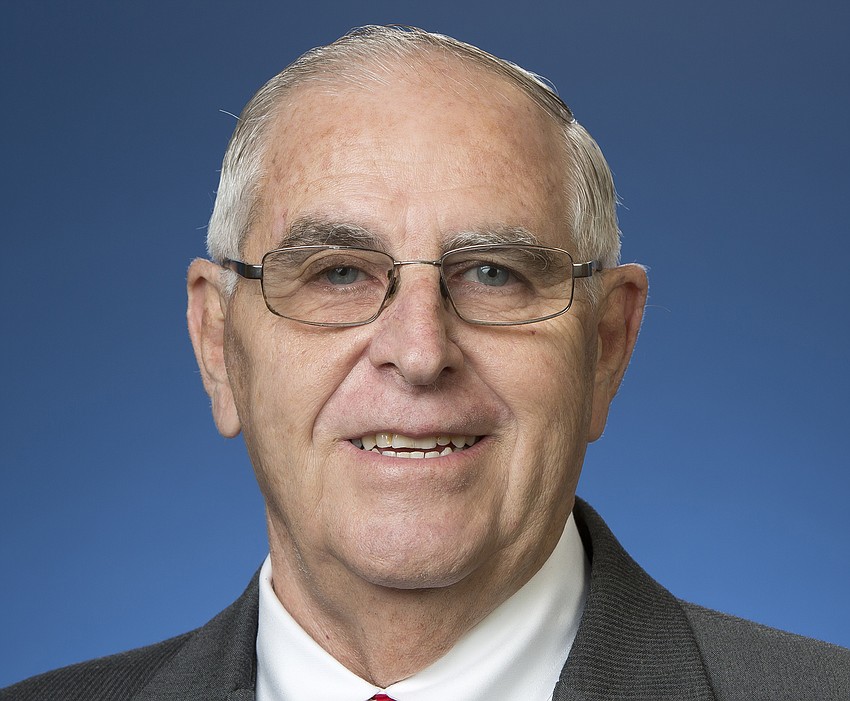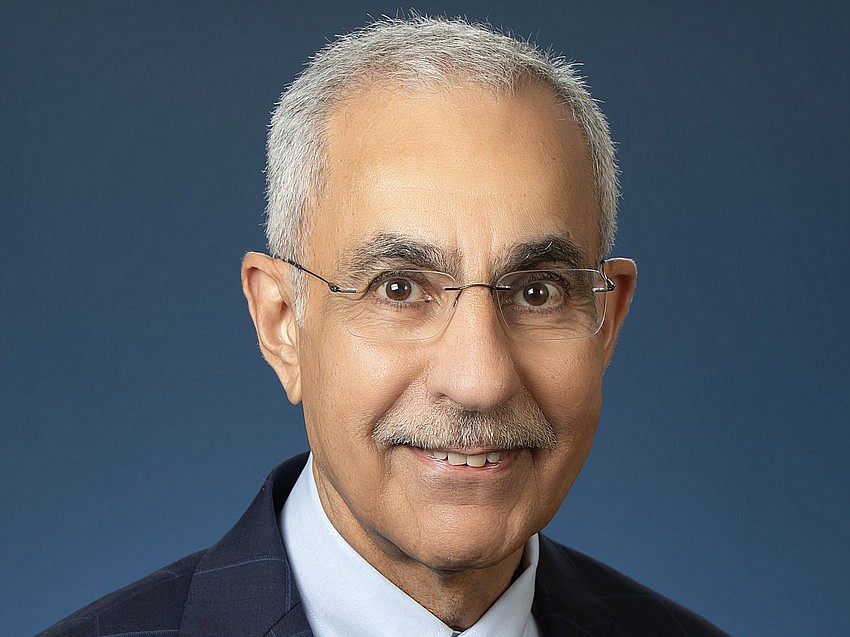
Portions of the community benefits agreement in the stadium deal between the city and the Jacksonville Jaguars would be separated out and considered as stand-alone legislation in an amendment crafted by City Council member Randy White in collaboration with Mayor Donna Deegan’s office.

White, the incoming Council president, announced the amendment at the start of a June 17 public hearing on legislation containing the stadium deal, Ordinance 2024-0904.
The move calls for parts of the benefits package that could pose conflicts of interest for some Council members to be singled out for consideration after Council’s annual summer break, the first two weeks of July.
The $300 million community benefits agreement is split between the Jaguars and the city. It’s part of a $1.4 billion deal for the “Stadium of the Future” renovation of EverBank Stadium.
White said the proposed $56 million for parks development would remain in the broader stadium bill, which includes eight individual agreements in addition to the community benefits. Those parts of the stadium ordinance are on target for a final Council vote June 25.

The remaining $94 million of the city’s $150 million contribution to the package would be uncoupled and considered later. That funding, aimed at workforce development, affordable housing and homelessness services, has generated concerns over conflicts of interest that would prevent voting among Council members working for organizations that could receive the funding.
For example, Council member Ju’Coby Pittman is CEO of the Clara White Mission, which provides homelessness services. Council member Kevin Carrico is an administrator for the Boys & Girls Clubs of Northeast Florida, which offers development support for young people with programming that includes workforce preparation.
Council President Ron Salem said the compromise would allow the maximum number of Council members to vote on the majority of the overall stadium deal — the parks funding plus the city’s contribution $775 million in construction costs, deferred maintenance and capital improvements.
“I’ve always said I’m going to do whatever I can to make sure as many Council members can vote, particularly on such significant legislation,” he said. “This may be the biggest piece of legislation we vote on in our four or eight years on the Council.”
Darnell Smith, Deegan’s chief of staff, told Council members the administration supported the amendment.
“I think the intent here tonight is to demonstrate our willingness to work closely with the Council to make certain we’re (addressing) any conflicts of interest,” Smith said.
Residents speak out
The public hearing drew more than 100 people, a large portion of whom were Eastside neighborhood residents. More than three dozen people spoke, with the vast majority calling for passage of the community benefits agreement.
Wearing orange shirts reading “Believe in OutEast,” a reference to another name for the neighborhood, residents described the predominantly Black community as struggling to overcome generations of neglectful or discriminatory treatment by city leadership. As a lingering result of being underfunded by City Hall and subjected to practices like redlining, they said, the Eastside lags the community in household income and property values.
Eastside resident Kenneth Covington asked Council members to keep the community benefits bundled with the stadium deal.
“The talk I heard about separating it and doing something later is a joke,” he said. “Because if you were going to do something, you would have done it already.”
The Rev. R.L. Gundy, senior pastor of Mt. Sinai Missionary Baptist Church, said the benefits would help mitigate the detrimental actions of previous city leadership.
“Let’s stop talking, let’s stop trying to figure this out,” he said. “Let’s just close our lips for a while, open our hearts and do the right thing.”

Michael Kirwan, president and chair of Scenic Jacksonville, said the benefits would boost the entire community by strengthening Downtown parks and spurring development of what he called the “struggling” Downtown.
In listening to speakers who came before him, Kirwan said, “it sounds to me like the CBA is considered very highly.”
“In fact, you may want to consider voting for it first,” he said.
Jack Meeks, an accountant and former candidate for Council, requested that the city conduct a five-year analysis of how the stadium deal would affect the city budget. He held up a copy of The Economist magazine containing a story headlined, “A new wave of stadium-building is busting budgets in America: The economics of ballparks are lousy, but politicians can’t resist subsidizing them.”
“We ought to know the numbers as to what this really does to our city’s finances,” he said.
Next steps
Salem said the amendment to carve out portions of the community benefits agreement would be introduced at a special Council meeting 9 a.m. to 3 p.m. June 20 at City Hall.
He has said it is important for Council to decide the stadium deal before it takes its annual summer break, after which it shifts its attention toward approving the city budget.
The Jaguars are seeking a finalized deal to present at the NFL owners’ meeting in October, where the team will need a two-thirds majority vote to proceed. Team president Mark Lamping told Council members on June 13 that although the team would prefer for the community benefits agreement not to be separated out, it would respect a decision by Council to vote on the deal without it attached.

At the public hearing, Council member Matt Carlucci said that although he supported keeping the full agreement intact, he commended White for his “very statesmanlike” efforts in forging the compromise.
“This is a good step,” he said.
White was elected as Council president in May. He will succeed Salem on July 1.
The Jaguars initially offered $100 million in benefits, which alone would have been the largest package in NFL history.
In the proposed 50-50 deal with the city, the Jaguars would make $5 million annual contributions over the agreement's 30-year term.
Deegan offered the city’s $150 million to draw an additional $50 million from the team.
The stadium portions of the deal call for the team and city to each contribute $625 million toward construction of the new facility, with the city providing an additional $150 million for deferred maintenance and capital improvements to prepare the existing structure for the project and make it usable by the Jaguars after work gets underway.
The community benefits agreement
The community benefits agreement would provide $30 million for the Eastside neighborhood surrounding the stadium and $50 million for Duval County at large. It also includes $1 million in funding for each of the 14 Council districts.
Some Council members agree with Deegan that the package will turbocharge development in the Eastside and Downtown, as the agreement calls for the city’s funding to be spent in the early years of the 30-year deal with the Jaguars contributing its small annual contribution. Proponents argue that without the benefits, the team’s funding will have an incremental effect on improvements.

Salem and some other members question whether the expenditure is responsible amid upcoming pending outlays for park development, construction of a new jail, completion-grant incentives for developers, increased city obligations under proposed pension reforms, and others.
Regarding a proposed $47.24 million in funding for three Northbank riverfront parks, Council member Nick Howland said the city had already included $82 million for riverfront parks in its five-year Capital Improvement Plan. He said 43% of the city’s $423 million budget for capital improvements in 2023-24 was funneled to projects in District 7, which includes Downtown.
At least two Council members, Rory Diamond and Raul Arias, have questioned whether the city’s portion of the benefits is needed considering that the Jaguars offered to supply $100 million without a city match.
JAX Chamber President Daniel Davis, the Jacksonville Civic Council, former Mayors John Delaney and John Peyton and former Jaguars owner Wayne Weaver are among those who have expressed support for the community benefits agreement.
Calls for the benefits to remain wrapped into the deal were in line with the results of polling conducted by the University of North Florida Public Opinion Research Lab. In late May, UNF announced that 41% would support the city’s proposed funding for the stadium on its own compared with 56% support with the benefits added.